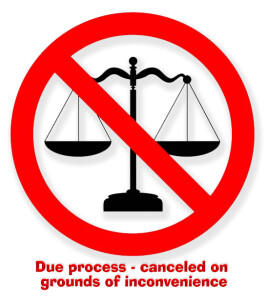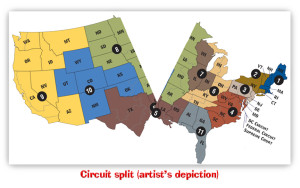We post news and comment on federal criminal justice issues, focused primarily on trial and post-conviction matters, legislative initiatives, and sentencing issues.

The Federal Bureau of Prisons is an agency with too little money, a $3 billion backlog of infrastructure repair needs, 4,000 fewer employees than needed, 143,000-plus prisoners in BOP facilities, and utterly chaotic management.
So what does the agency need more than anything right now? How about a mandate to rehab a prison with a 300-inmate capacity that was shut down for being too costly some 62 years ago.
 What a great idea! What could possibly go wrong?
What a great idea! What could possibly go wrong?
In what the Associated Press called “a stunning directive from President Donald Trump,” the BOP was told in a Truth Social tweet last Sunday night to “REBUILD, AND OPEN ALCATRAZ!” — the legendary federal penitentiary that still stands on an island in San Francisco 62 years after it last imprisoned an inmate.
“Even as the Bureau of Prisons struggles with short staffing, chronic violence and crumbling infrastructure at its current facilities,” AP reported on Monday, “Trump is counting on the agency to fulfill his vision of rebooting the infamously inescapable prison known in movies and pop culture as ‘The Rock.’”
Alcatraz, the island located off the coast of San Francisco, was closed as a prison in 1963 and has since been turned into a museum run by the National Park Service, a tourist attraction generating about $6 million in revenue annually. The BOP closed the prison after determining that an estimated $3-5 million was needed just for restoration and maintenance work to keep the facility open. That’s $31-52 million in 2025 dollars, and that doesn’t account for deterioration over the past 62 years since closure.
The number also did not include daily operating costs. The BOP says Alcatraz was nearly three times more expensive to operate than other prisons. In 1962, BOP Director James Bennett said it was not an “economically sound policy” to invest millions of dollars to rehab Alcatraz. Housing an inmate in Alcatraz costs more than three times what it costs in Atlanta.
 On its website, the BOP says: “The major expense was caused by the physical isolation of the island – the exact reason islands have been used as prisons throughout history. This isolation meant that everything (food, supplies, water, fuel…) had to be brought to Alcatraz by boat. For example, the island had no source of fresh water, so nearly one million gallons of water had to be barged to the island each week.” Add to that staff costs: in San Francisco, federal pay would be adjusted for the sky-high cost of living in the Bay Area, which ranks 7th out of 9,294 metro areas on earth.
On its website, the BOP says: “The major expense was caused by the physical isolation of the island – the exact reason islands have been used as prisons throughout history. This isolation meant that everything (food, supplies, water, fuel…) had to be brought to Alcatraz by boat. For example, the island had no source of fresh water, so nearly one million gallons of water had to be barged to the island each week.” Add to that staff costs: in San Francisco, federal pay would be adjusted for the sky-high cost of living in the Bay Area, which ranks 7th out of 9,294 metro areas on earth.
The BOP already has a “supermax” facility, ADMAX Florence, holding 354 inmates and 13 penitentiaries that together imprison over 17,200 high-security inmates. Alcatraz never even held its capacity of 336 inmates.
At no time has the BOP argued it needs more high-security or ADMAX beds. In fact, the BOP’s sole new facility in the planning stages is a new medium-security prison in Letcher County, Kentucky.
None of the economics or agency needs analysis matters to President Trump. Rather, his idea to reopen Alcatraz is a reflection of his political instincts and personal tastes, even as it is a long shot to come to fruition.
Trump’s suggestion that Alcatraz could once again be a penitentiary for hardened criminals highlights both his efforts to project a tough-on-crime image and his fondness for cultural symbols of past generations:
 “For too long, America has been plagued by vicious, violent, and repeat Criminal Offenders, the dregs of society, who will never contribute anything other than Misery and Suffering,” Trump wrote on Truth Social. “When we were a more serious Nation, in times past, we did not hesitate to lock up the most dangerous criminals, and keep them far away from anyone they could harm. That’s the way it’s supposed to be.”
“For too long, America has been plagued by vicious, violent, and repeat Criminal Offenders, the dregs of society, who will never contribute anything other than Misery and Suffering,” Trump wrote on Truth Social. “When we were a more serious Nation, in times past, we did not hesitate to lock up the most dangerous criminals, and keep them far away from anyone they could harm. That’s the way it’s supposed to be.”
Trump’s nostalgia may be misplaced. He was recalling a time (1961) when the nation was incarcerating 119 people per 100,000 population. By last year, the state and federal government were locking up almost five times that number, 531 people per 100,000 population, the 6th highest rate in the world.
The facts are irrelevant. What matters is that Trump thinks Alcatraz is symbolic, that “it represents something. Right now, it’s a big hulk that’s sitting there rusting and rotting,” he told reporters. “It sort of represents something that’s both horrible and beautiful, and strong and miserable. Weak. It’s got a lot of qualities that are interesting.”
When Trump was asked what inspired him to reopen Alcatraz, he said, “Well, I guess I was supposed to be a moviemaker.”
Newly minted BOP Director William K. Marshall III promptly issued a statement enthusiastically supporting Trump’s call. He promised that the BOP “will vigorously pursue all avenues to support and implement the President’s agenda.
“I have ordered an immediate assessment to determine our needs and the next steps,” Marshall said in the statement. “USP Alcatraz has a rich history. We look forward to restoring this powerful symbol of law, order, and justice.”
 Good luck with that, Bill. The BOP needs $3 billion for infrastructure repair. It asked Congress for $260 million for Fiscal Year 2025. It got $179 million. Of the $3 billion needed to repair existing BOP facilities, Walter Pavlo wrote in Forbes last fall, “Spending at these levels is simply not going to happen.”
Good luck with that, Bill. The BOP needs $3 billion for infrastructure repair. It asked Congress for $260 million for Fiscal Year 2025. It got $179 million. Of the $3 billion needed to repair existing BOP facilities, Walter Pavlo wrote in Forbes last fall, “Spending at these levels is simply not going to happen.”
Earlier this year, BOP issued a memorandum to senior leaders that it had to take on more than $400 million in new expenses — due to a government-wide 5.2% pay increase for employees and inflation — without receiving any additional funding to cover it. While the agency said it should prioritize hiring, a corrections officer and union representative told Government Executive in October that workers “are leaving in droves” and “running from this agency” because of job strain.
Six weeks ago, the BOP cut all retention bonuses, meant to stop the loss of staff, especially correctional officers.
It doesn’t much matter what Billy says the BOP will “vigorously pursue.” The BOP is a NASCAR driver punching the accelerator on a car that’s out of gas.
Corene Kendrick, ACLU National Prison Project deputy director, dismissed Trump’s Alcatraz statement as a “stunt.” She told the Guardian, “I don’t know if we can call it a ‘proposal’, because that implies actual thought was put into it. It’s completely far-fetched and preposterous, and it would be impossible to reopen those ancient, crumbling buildings as anything resembling a functioning prison.”
 The Los Angeles Times warned that “it’s easy, as many quickly did, to write off this push to spruce up and fill up America’s most notorious prison-turned-national park as just bloviating or distraction. But like the sharks that circle that island in the Bay, the real danger of the idea lurks beneath the surface… Trump in recent weeks has moved to undo years of criminal justice reform. He is making changes that increase police power, signaling a push to refill federal prisons and detention centers with Black and brown people and curbing the ability of those impacted to seek redress in courts.”
The Los Angeles Times warned that “it’s easy, as many quickly did, to write off this push to spruce up and fill up America’s most notorious prison-turned-national park as just bloviating or distraction. But like the sharks that circle that island in the Bay, the real danger of the idea lurks beneath the surface… Trump in recent weeks has moved to undo years of criminal justice reform. He is making changes that increase police power, signaling a push to refill federal prisons and detention centers with Black and brown people and curbing the ability of those impacted to seek redress in courts.”
The Times argued that reopening Alcatraz as a prison “is nostalgia for an America where power ran roughshod over true justice, and police were an authority not to be questioned — or restrained.”
Associated Press, The federal Bureau of Prisons has lots of problems. Reopening Alcatraz is now one of them (May 6, 2025)
The Hill, Trump’s call to reopen Alcatraz faces ‘daunting’ challenges (May 5, 2025)
NBC News, Trump’s call to reopen Alcatraz as a prison could be stymied by roadblocks (May 5, 2025)
The Guardian, Not just Alcatraz: the notorious US prisons Trump is already reopening (May 6, 2025)
BOP, The Rock
Forbes, The Bureau Of Prisons Under A Trump Administration (November 7, 2025)
Los Angeles Times, The real threat behind reopening Alcatraz (May 5, 2025)
– Thomas L. Root


 Mark Twain once said, “A lie can travel half way around the world while the truth is putting on its shoes.”
Mark Twain once said, “A lie can travel half way around the world while the truth is putting on its shoes.” Myth 1 – All minimum-security federal inmates with fewer than five years left are being sent to home confinement. I get at least a dozen emails a week on this one: Is it true that Trump signed an executive order sending campers home? Is it true that it will all happen in September? Is it true that all the camps will close?
Myth 1 – All minimum-security federal inmates with fewer than five years left are being sent to home confinement. I get at least a dozen emails a week on this one: Is it true that Trump signed an executive order sending campers home? Is it true that it will all happen in September? Is it true that all the camps will close? Myth 2 – Send me a copy of the new meth law: I get nearly as many emails from people asking me to send them a copy of the “new meth law.” Do I look like a lending library? No matter, the response is straightforward. There is no new meth law.
Myth 2 – Send me a copy of the new meth law: I get nearly as many emails from people asking me to send them a copy of the “new meth law.” Do I look like a lending library? No matter, the response is straightforward. There is no new meth law. A few points: First, a Guideline is not a law. Judges must follow laws but not guidelines. Laws can be passed that trample guidelines, but guidelines cannot negate laws. Second, the drug trafficking sentence statute (21 USC § 841(b)) contains enhanced penalties for pure meth, and any guidelines change would not change the law and therefore have limited effect. Third, no one in the Republican majority Congress has any interest in easing the drug laws right now, even if fentanyl is the drug bad-boy-of-choice right now.
A few points: First, a Guideline is not a law. Judges must follow laws but not guidelines. Laws can be passed that trample guidelines, but guidelines cannot negate laws. Second, the drug trafficking sentence statute (21 USC § 841(b)) contains enhanced penalties for pure meth, and any guidelines change would not change the law and therefore have limited effect. Third, no one in the Republican majority Congress has any interest in easing the drug laws right now, even if fentanyl is the drug bad-boy-of-choice right now.































